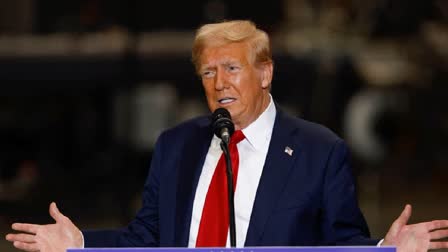Washington:President-elect Donald Trump's choice for defense secretary is still up in the air, but it is a sure bet he will look to reshape the Pentagon and pick a loyalist. During his tumultuous first term, five men held the job as Pentagon chief only to resign, be fired or serve briefly as a stopgap.
While he has yet to announce a decision, the names of potential Pentagon chiefs stretch from the well known — such as Rep. Mike Rogers, chairman of the House Armed Services Committee — to an array of former administration loyalists, including retired Lt. Gen. Keith Kellogg, who held national security posts during Trump's first term.
Former Secretary of State Mike Pompeo had been floated, but Trump said on social media Saturday that Pompeo would not be joining the new administration. Rep. Michael Waltz of Florida had also been mentioned, but he's now been tapped to be Trump's national security adviser. Some decisions may linger for days as candidates jostle for attention and officials wait for the final results from House races, weighing whether Republican lawmakers can be tapped or if others are a safer pick to avoid a new election for an empty congressional seat.
“The choice is going to tell us a lot about how he will deal with the Pentagon,” said Mark Cancian, senior adviser with the Center for Strategic and International Studies and a retired Marine colonel. He said someone with a deep military background may not be as dramatic of a change as others who may be viewed as stronger Trump loyalists.
With several top jobs at the State Department, National Security Council and Defense Department up for grabs, Trump is expected to lean toward those who back his desire to end U.S. involvement in any wars, use the military to control the U.S.
Mexico border and take a hard line on Iran. The key test, however, will be loyalty and a willingness to do whatever Trump wants, as he seeks to avoid the pushback he got from the Pentagon the first time around. Trump's relationship with his civilian and military leaders during those years was fraught with tension, confusion and frustration, as they struggled to temper or even simply interpret presidential tweets and pronouncements that blindsided them with abrupt policy decisions they weren't prepared to explain or defend.
Time after time, senior Pentagon officials — both in and out of uniform — worked to dissuade, delay or derail Trump, on issues ranging from his early demand to prohibit transgender troops from serving in the military and his announcements that he was pulling troops out of Syria, Iraq and Afghanistan to his push to use troops to police the border and stem civil unrest on the streets of Washington.
In his first administration, Trump hewed toward what he considered strong military men and defense industry executives. Initially enamored with generals, Trump over time found them to be not loyal enough. “He soured on them,” Cancian said. “They were not as pliable as he had thought. ... I’ve heard people speculate that maybe the chairman would be fired. So that’s something to watch.”
Air Force Gen. CQ Brown, took over as chairman of the Joint Chiefs of Staff in October 2023 for a four-year term, but military leaders serve at the pleasure of the president. Brown, a combat pilot and just the second Black officer to serve as chairman, spoke out after the police killing of George Floyd, describing the bias he faced in his life and career.
